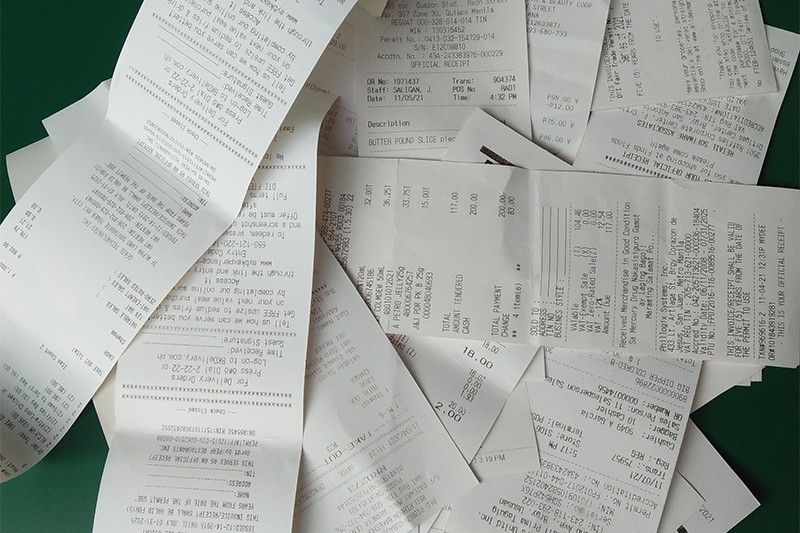Envi groups flag toxic BPA, BPS in thermal paper receipts

MANILA, Philippines — Thermal paper receipts containing toxic chemicals may put women cashiers at greater risk for reproductive health problems, a recent study by environmental watchdogs found.
The EcoWaste Coalition and the Interfacing Development Interventions for Sustainability (IDIS) found higher concentrations of Bisphenol-A (BPA) and its chemical cousin Bisphenol-S (BPS) in thermal paper receipts in select local establishments. This exceeded the European Union’s limit of 0.02%.
The EcoWaste Coalition and IDIS collected at least 53 thermal receipt samples in November 2021 from various business and government establishments in the cities of Davao, Makati, Quezon, Taguig and Manila.
Of the 53 analyzed samples, 32 contained BPA with a concentration range of 0.92% to 1.86%. Meanwhile, 13 had BPS with concentrations ranging from 0.61% to 1.12%.
BPA and BPS are classified as endocrine disrupting chemicals (EDCs), or non-natural chemicals that interfere with the body’s hormones resulting in health problems, especially for women cashiers and pregnant mothers.
“Cashiers who handle hundreds of thermal transaction receipts each day tend to be more exposed to these EDCs as these compounds are easily absorbed by the body through the skin,” EcoWaste told Philstar.com.
Considered ‘reproductive toxicant,’ BPA and its cousin BPS have been linked to reproductive health problems such as infertility, polycystic ovarian syndrome, miscarriage, premature delivery, low birth weight and breast cancer.
“Customers are not spared. As we, humans, are exposed to other sources of bisphenols such as in food packaging, touching BPA/BPS in thermal receipts may contribute to additional exposure to these EDCs,” EcoWaste added.
The groups noted that BPA was detected more in local franchise stores, small and large supermarkets, convenience stores, banks and hospitals or pharmacies. Meanwhile, BPS was more commonly used in global franchise stores.
Urgent policy needed
In their joint letter sent to the Department of Trade and Industry (DTI), the groups called for the phase-out of BPA and BPS-laden thermal receipts from the Philippine market in a bid to reduce cashiers and customers’ exposure to the toxicants.
The Philippines currently does not impose any other regulations on using BPA and BPS aside from the Food and Drug Administration’s 2019 ban on BPA in infant feeding bottles and sippy cups as child care products.
“Society’s inaction to address BPA/BPS in thermal paper receipts will mean continued exposure for cashiers and their customers to such a preventable source of EDC exposure,” the EcoWaste Coalition said.
The groups also called on the DTI to create a national regulatory body that would restrict BPA and BPS in thermal paper receipts, following the footsteps of the European Union and Switzerland.
Since January 2020, the EU has banned the use of BPA in thermal paper from the market after the European Chemicals Agency (ECHA) flagged the chemical as a “substance of very high concern.” BPA has also been restricted as a substance on its own and in mixtures for commercial use in the EU since March 2018, according to the ECHA’s website.
Switzerland has also restricted the use of thermal paper with BPA and BPS concentrations of 0.02% or more since June 2020.
Amid the lack of regulation on thermal receipts in the Philippines, the groups advised store management to explore alternative paper receipts. Cashiers are urged to avoid marking thermal receipts with their fingernails, touching the printed side of the receipt, and using alcohol-based hand sanitizers before or after handling receipts.
They also cautioned the public, especially pregnant women, from accepting thermal paper receipts in transactions when possible. Handling thermal paper receipts should also be avoided after using alcohol-based hand sanitizers, as they could speed up the BPA absorption from receipts
- Latest
























